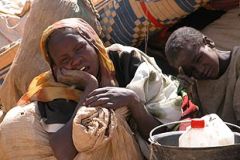US says UN force needed to stop Sudan offensive in Darfur
Aug 25, 2006 (WASHINGTON) — A senior State Department official said Friday deployment of a U.N. force in Darfur is essential to help stop what she described as a planned Sudanese government offensive in its western border region.
 Assistant Secretary of State Jendayi Frazer spoke to reporters hours before leaving for Sudan to exhort Sudanese officials to accept the presence of a peacekeeping force representing the United Nations.
Assistant Secretary of State Jendayi Frazer spoke to reporters hours before leaving for Sudan to exhort Sudanese officials to accept the presence of a peacekeeping force representing the United Nations.
Sudanese President Omar el-Bashir, who opposes such a force on Sudanese territory, has said he plans to send troops to Darfur to pacify the region where a small and largely ineffectual African Union force now patrols.
Frazer said the people of Darfur wouldn’t regard government troops as a neutral force because of Khartoum’s record of supporting Janjaweed militias who have terrorized the region.
At the same time, she said, the abuses of anti-government rebel forces in Darfur shouldn’t be ignored. Despite a peace agreement signed last May between the government and the largest rebel organization, rebels have been killing civilians and burning villages, she said.
Frazer, who will meet with el-Bashir in the coming days, said she is willing to go the “last mile” to overcome his opposition to a U.N. force.
The financially strapped 7,000-strong AU force now deployed in Darfur is to cease to exist on Sept. 30. Under a proposal that Frazer says has broad backing in the U.N. Security Council, the Africans would be “rehatted” as a U.N. force the next day and eventually be joined by other soldiers.
Unless the U.N. force can be created, there will be no force in place in Darfur “to stop this government from carrying out what has been the genocide,” Frazer said.
She predicted that her mission to Khartoum will be successful.
“I’m fully confident there will be a transition to a U.N. force,” she said.
In the more than three years since black Muslim African rebels seeking autonomy from Sudan’s Muslim government, which is dominated by Sudanese of Arab descent, more than 200,000 people have been killed and 2 million have been displaced.
(AP/ST)
